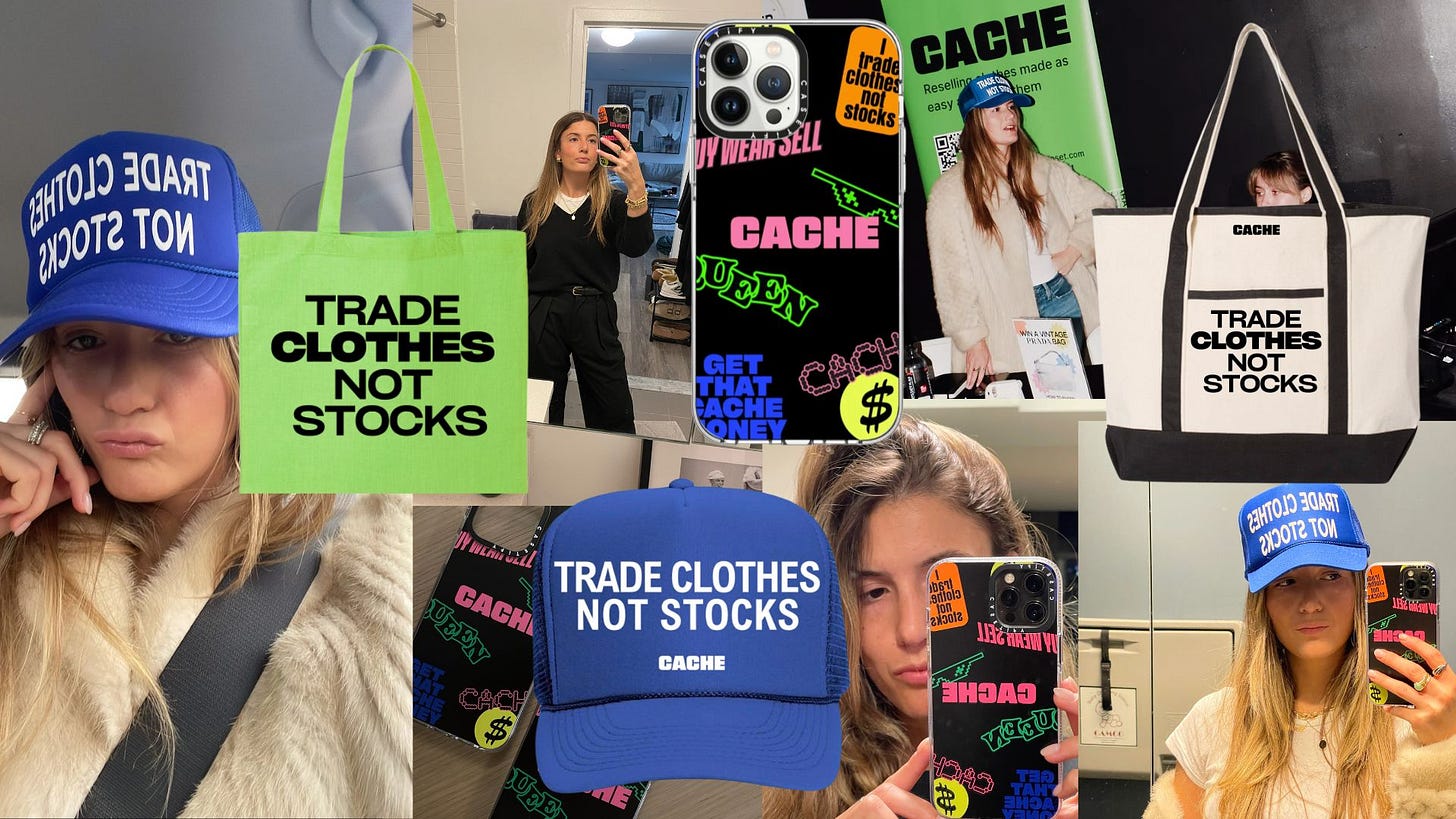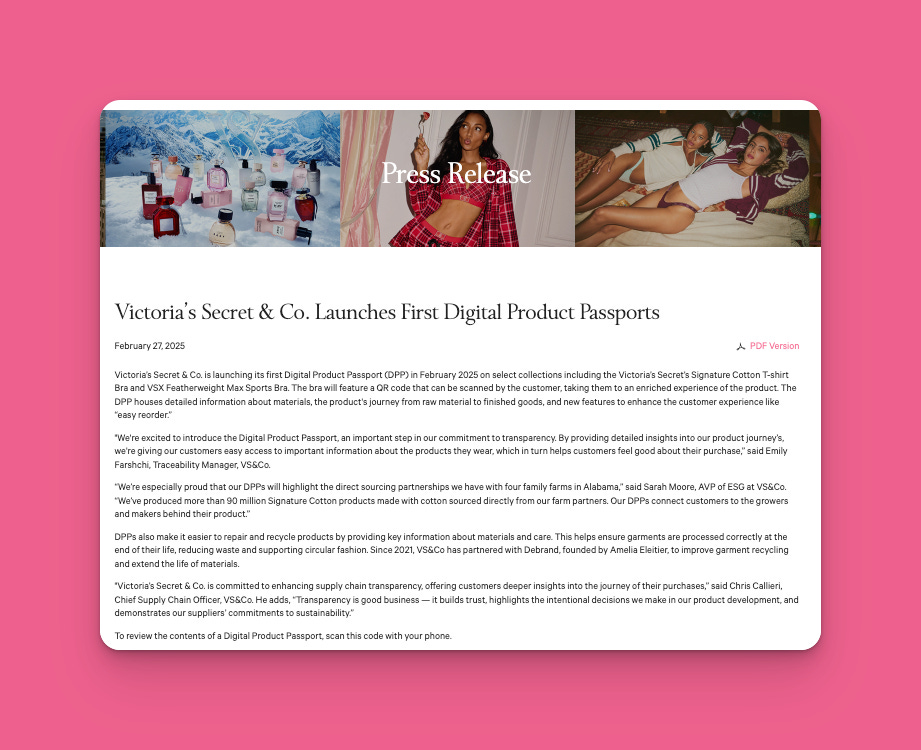Cache Flow #13: Fashion News Roundup
February 21-28: This Week in Fashion x Tech x Resale News
In this weekly series, we feature a roundup of the latest news in fashion x tech x resale.
Cache is your personal resale assistant, designed to make resale frictionless, profitable, and sustainable.
Cache automatically scans your purchase receipts from email to instantly build your digital wardrobe.
Using AI-driven insights, Cache helps you understand market value and allows users to list items across resale marketplaces with a single click.
We’re transforming resale from a hassle to a habit. Join our waitlist to experience the future of resale.
🚨 Big news—we just dropped Cache merch, and you’re the first to know!
We designed this collection for the resale-obsessed, fashion-as-an-asset-class believers who are redefining how we buy, sell, and trade clothes (not stocks 😉).
👉 Pre-order your exclusive merch here 👈
In response to President Trump's threat of imposing tariffs on Canadian goods, Canadian fashion designers are adopting creative strategies to navigate potential economic challenges: Some are exploring alternative sourcing and production methods to mitigate the impact of tariffs. Additionally, there's a growing movement among designers to emphasize Canadian-made products, aligning with a broader "Buy Canadian" campaign that encourages consumers to support domestic goods. This initiative aims to bolster the local economy and reduce reliance on imports, reflecting a surge of economic nationalism in Canada.
Research reveals three key trends driving impulse purchases: These include increased interaction with screens, advertisements with a social purpose, and self-representation bias. More interactive screens, like those used by Zara, encourage consumers to make impulse purchases by creating a sense of control. Advertisements that emphasize social causes also boost impulsive buying, as consumers justify the purchase by feeling it benefits a larger cause. Additionally, even those who consider themselves mindful are prone to making impulse purchases, highlighting a disconnect between self-perception and behavior.
AI is transforming retail by aligning with consumer expectations for personalization and convenience: AI technologies like predictive analytics, chatbots, and personalized recommendations are becoming key tools for retailers to offer tailored experiences and enhance customer satisfaction. This shift reflects the demand for more efficient and customized shopping, as AI helps consumers find products quickly and even shop for holiday gifts. AI-driven platforms are moving beyond traditional search engines, changing the way shoppers discover and purchase items online.
Victoria’s Secret & Co. is launching its first Digital Product Passports (DPPs) to enhance transparency and sustainability in its supply chain: The passports, powered by EON’s CircularID technology, will provide customers with detailed product information, including materials, sourcing, and care instructions. This initiative aligns with the brand’s commitment to circular fashion by promoting responsible consumption and future resale or recycling. The DPPs will debut with the VS x Naomi Osaka collection, marking a step toward greater digital traceability in fashion.
Quantifying the environmental impact of circular fashion, specifically resale and repair is not easy: Specifically, Vogue Business reports on the difficulty of measuring the "displacement rate" (how much new production is avoided). Recent data suggests that resale displaces around 64.6% of new items and repair displaces 82.2%, although these figures are still debated and need standardization. Companies like Vestiaire Collective, Depop, and eBay are working to improve methodologies, hoping to prove circular models' environmental benefits and boost investment in the sector.
The U.S. economy is increasingly reliant on the top 10% of earners, whose spending now accounts for nearly half of all consumption (a record level): High earners, buoyed by gains in stocks and real estate, significantly increased their spending between September 2023 and September 2024, contrasting with declining expenditures among the middle and working classes. If the top earners' confidence wanes due to market downturns, it could severely impact economic growth. Rising asset prices have widened the wealth gap, and affluent individuals have bolstered their net worth significantly more than others. This divide is impacting various sectors differently, with luxury goods and high-end travel thriving while companies targeting lower-income consumers struggle.
Saks is launching its luxury fashion offerings on Amazon: The partnership will allow Saks to tap into Amazon's massive global reach while maintaining its luxury brand identity. The move is expected to help Saks compete with other major luxury retailers online and adapt to changing consumer shopping habits, especially among younger, tech-savvy shoppers.
Retailers are struggling to maintain in-store inventory, leading to frustration among shoppers who leave empty-handed: Many stores, especially post-pandemic, have cut back on stock levels, forcing customers to order online, even though in-store purchases are more profitable for retailers. While some high-end retailers like Nordstrom manage to maintain better service, the overall in-store experience has declined due to competition from e-commerce giants and cost-cutting measures.
’s Magasin Brand Rank 2024 highlights the most in-demand fashion brands based on data from retail and Magasin’s platform: COS topped the list due to viral products, fashion shows, and a unique brand strategy, while J.Crew secured second place with high-profile collaborations. The Row maintained its status as a luxury benchmark, Gap saw success through affordable basics, and Uniqlo thrived on collaborations. The ranking is based on millions of brand interactions, including clicks, mentions, and purchases.
Have thoughts/opinions/questions on any of the above? Let’s discuss! Join the conversation at the link above.
With love and hot girl energy,
Cache 💚
















